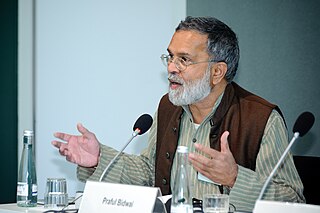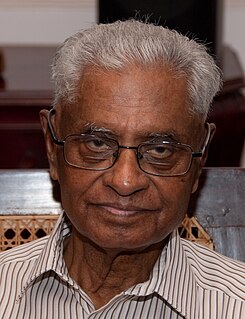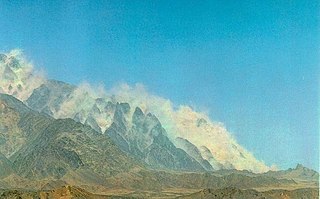
The Treaty on the Non-Proliferation of Nuclear Weapons, commonly known as the Non-Proliferation Treaty or NPT, is an international treaty whose objective is to prevent the spread of nuclear weapons and weapons technology, to promote cooperation in the peaceful uses of nuclear energy, and to further the goal of achieving nuclear disarmament and general and complete disarmament. Between 1965 and 1968, the treaty was negotiated by the Eighteen Nation Committee on Disarmament, a United Nations-sponsored organization based in Geneva, Switzerland.

Nuclear proliferation is the spread of nuclear weapons, fissionable material, and weapons-applicable nuclear technology and information to nations not recognized as "Nuclear Weapon States" by the Treaty on the Non-Proliferation of Nuclear Weapons, commonly known as the Non-Proliferation Treaty or NPT. Proliferation has been opposed by many nations with and without nuclear weapons, as governments fear that more countries with nuclear weapons will increase the possibility of nuclear warfare, de-stabilize international or regional relations, or infringe upon the national sovereignty of nation states.

Operation Smiling Buddha was the assigned code name of India's first successful nuclear bomb test on 18 May 1974. The bomb was detonated on the army base Pokhran Test Range (PTR), in Rajasthan, by the Indian Army under the supervision of several key Indian generals.

Since the Partition of British India in 1947 and subsequent creation of the dominions of India and Pakistan, the two countries have been involved in a number of wars, conflicts, and military standoffs. A long-running dispute over Kashmir and cross-border terrorism have been the predominant cause of conflict between the two states, with the exception of the Indo-Pakistani War of 1971, which occurred as a direct result of hostilities stemming from the Bangladesh Liberation War in erstwhile East Pakistan.

India has developed and possesses weapons of mass destruction in the form of nuclear weapons. Although India has not released any official statements about the size of its nuclear arsenal, recent estimates suggest that India has 160 nuclear weapons and has produced enough weapons-grade plutonium for up to 161–200 nuclear weapons. In 1999, India was estimated to have 800 kilograms (1,800 lb) of separated reactor-grade plutonium, with a total amount of 8,300 kilograms (18,300 lb) of civilian plutonium, enough for approximately 1,000 nuclear weapons. India has conducted nuclear weapons tests in a pair of series namely Pokhran I and Pokhran II.

Pakistan is one of nine states to possess nuclear weapons. Pakistan began development of nuclear weapons in January 1972 under Prime Minister Zulfikar Ali Bhutto, who delegated the program to the Chairman of the Pakistan Atomic Energy Commission (PAEC) Munir Ahmad Khan with a commitment to having the device ready by the end of 1976. Since PAEC, which consisted of over twenty laboratories and projects under reactor physicist Munir Ahmad Khan, was falling behind schedule and having considerable difficulty producing fissile material, Abdul Qadeer Khan, a metallurgist working on centrifuge enrichment for Urenco, joined the program at the behest of Bhutto administration by the end of 1974. As pointed out by Houston Wood, "The most difficult step in building a nuclear weapon is the production of fissile material"; as such, this work in producing fissile material as head of the Kahuta Project was pivotal to Pakistan developing the capability to detonate a nuclear bomb by the end of 1984.

Praful Bidwai was an Indian journalist, political analyst, and activist. He was known for his left-leaning analysis of India's politics and economics. In Bidwai's memory, his friends, including The Transnational Institute, created the Praful Bidwai Memorial Award intended to honor and highlight courageous and independent voices in journalism.
The New Agenda Coalition (NAC), composed of Brazil, Egypt, Ireland, Mexico, New Zealand and South Africa, is a geographically dispersed group of middle power countries seeking to build an international consensus to make progress on nuclear disarmament, as legally called for in the nuclear NPT.

The Pokhran-II tests were a series of five nuclear bomb test explosions conducted by India at the Indian Army's Pokhran Test Range in May 1998. It was the second instance of nuclear testing conducted by India; the first test, code-named Smiling Buddha, was conducted in May 1974.

Krishnaswamy Subrahmanyam was a prominent international strategic affairs analyst, journalist and former Indian civil servant. Considered a proponent of Realpolitik, Subrahmanyam was an influential voice in Indian security affairs for a long time. He was most often referred to as the doyen of India's strategic affairs community, and as the premier ideological champion of India's nuclear deterrent. His son S Jaishankar was appointed India's External Affairs Minister in 2019.

The Lahore Declaration was a bilateral agreement and governance treaty between India and Pakistan. The treaty was signed on 21 February 1999, at the conclusion of a historic summit in Lahore, and ratified by the parliaments of both countries the same year.

Chagai-I is the code name of five simultaneous underground nuclear tests conducted by Pakistan at 15:15 hrs PKT on 28 May 1998. The tests were performed at Ras Koh Hills in the Chagai District of Balochistan Province.

United Nations Security Council resolution 1540 was adopted unanimously on 28 April 2004 regarding the non-proliferation of weapons of mass destruction. The resolution establishes the obligations under Chapter VII of the United Nations Charter for all member states to develop and enforce appropriate legal and regulatory measures against the proliferation of chemical, biological, radiological, and nuclear weapons and their means of delivery, in particular, to prevent the spread of weapons of mass destruction to non-state actors.

United Nations Security Council Resolution 1874 was adopted unanimously by the United Nations Security Council on 12 June 2009. The resolution, passed under Chapter VII, Article 41, of the UN Charter, imposes further economic and commercial sanctions on the Democratic People's Republic of Korea and encourages UN member states to search North Korean cargo, in the aftermath of an underground nuclear test conducted on 25 May 2009.
India was among the original members of the United Nations that signed the Declaration by United Nations at Washington, D.C. on 1 January 1942 and also participated in the United Nations Conference on International Organization at San Francisco from 25 April to 26 June 1945. As a founding member of the United Nations, India strongly supports the purposes and principles of the UN and has made significant contributions in implementing the goals of the Charter, and the evolution of the UN's specialised programmes and agencies.

United Nations Security Council resolution 707, adopted unanimously on 15 August 1991, after recalling Resolution 687 (1991) and hearing representations from the International Atomic Energy Agency (IAEA) and United Nations Special Commission, the council, acting under Chapter VII, condemned Iraq for violations and non-compliance of Resolution 687 (1991) and extended powers to the Special Commission and IAEA.
Pakistan officially joined the United Nations (UN) on 30 September 1947 just over a month after it came into existence. Today, it is a charter member and participates in all of the UN's specialised agencies and organisations. Pakistan has been elected seven times into the UN Security Council, with the most recent term in 2013. It is also one of the countries which has had a diplomat, Muhammad Zafarullah Khan, serve a term as the President of the United Nations General Assembly.

The Treaty on the Prohibition of Nuclear Weapons (TPNW), or the Nuclear Weapon Ban Treaty, is the first legally binding international agreement to comprehensively prohibit nuclear weapons with the ultimate goal being their total elimination. It was adopted on 7 July 2017, opened for signature on 20 September 2017, and entered into force on 22 January 2021.















